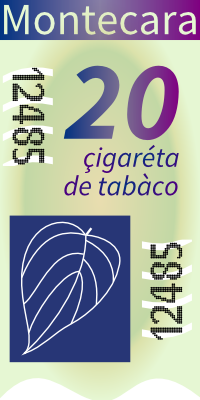Taxation in Montecara
Taxation in Montecara is administered by the Secretariat of Finance.
Montecara is known as a tax haven and offshore financial hub thanks to its lack of income, capital gains, and estate taxes. The state does, however, assess a variety of other taxes and fees that contribute to its overall operating revenue.
Montecara operates a single-tier tax system; i.e., there is no dividend tax.
Excises
Excises are per unit taxes paid on specific types of goods.
| Type | Rate | 2017 revenue (millions Ł) | |
|---|---|---|---|
| Alcohol | Ł65/liter of pure ethanol | 752 | |
| Cannabis | Ł15/g | 657 | |
| Electricity | Ł22/MW·h | 316 | |
| Fuel | |||
| Coal and coke | Ł15.50/Gj | 29 | |
| Diesel | Ł6.35/l | 4,171 | |
| Gasoline | Ł5.75/l | 4,966 | |
| Heavy fuel oil | Ł2.85/l | 4,796 | |
| Kerosene | Ł3.00/l | 940 | |
| LPG | Ł1.90/l | 154 | |
| Natural gas | Ł2.55/m³ | 3,389 | |
| Tobacco | Ł12/pack of 20 cigarettes Ł7/cigar ≤ 10g Ł9/cigar > 10g Ł0.65/g loose tobacco |
2,433 | |
Tariffs
Montecara is a free port and levies tariffs on only two line items: fresh fish at 3.5% and works of art at 6%. The overall weighted mean tariff rate is 0.0%. Receipts from tariffs totaled approximately Ł133 million (€26 million) in 2019.
Taxes
Land value tax is assessed on the unimproved value of land. Withholding tax is assessed on income earned in Montecara by non-resident foreign workers (entertainers, athletes, etc.).
| Type | Rate | 2022 revenue (millions €) | |
|---|---|---|---|
| Air transport tax | Cargo | Ł16/tonne | |
| Passengers | 5% of ticket price | ||
| Corporation tax | |||
| Income earned in Montecara by entities incorporated abroad | 13.5% | ||
| Income earned abroad by domestically incorporated entities | 7.5% | ||
| Domestic income earned by domestically incorporated entities | 0% | 0 | |
| Foreign insurance tax | 4.75% of premium | ||
| Franchise tax | Varies | ||
| Land value tax | 0% - 2.75% | ||
| Mortgage tax | 0.9% of each payment | ||
| Value-added tax | 20% standard rate, 12% reduced rate | 13,650 | |
| Withholding tax | 18% | ||
Fees
| Type | Rate | 2017 revenue (millions Ł) |
Notes |
|---|---|---|---|
| Air and sea transit | Varies | 62 | Charged to aircraft and ships transiting Montecaran seas and airspace. |
| Cruise ship passenger fee | Ł425/passenger | 81 | |
| Incorporation | Ł2,500 | 17 | Flat fee assessed on incorporating a new business. |
| Landing and docking | Varies | 10,445 | Assessed on aircraft and ships using Montecara's port or airport. |
| License plate auction revenue | Varies | 623 | |
| Road use vignette | Varies | 10,445 | |
| Ship registration | Varies | 43 | Costs vary with size, class, and age of ship. Montecara has an open ship registry and is a popular flag of convenience. |
| Vehicle registration | Varies | 8,623 |
Hypothecated fees and surcharges
Revenue from these sources is dedicated to specific purposes rather than being paid into the general account.
| Type | Rate | Notes |
|---|---|---|
| Climate surcharge | Ł88.20/tonne emitted CO2‑e | Assessed on emissions of carbon dioxide, methane, nitrous oxide, and fluorinated gases not otherwise taxed. Revenue is earmarked to subsidize replacement technologies for these gases. |
| Electronic goods recycling fee | 3% | Collected at sale and earmarked for e-waste recycling. |
| Fishing equipment surcharge | 12% | Collected at sale and earmarked for the cleanup of waste from Montecaran waters and beaches. |
| Landfill waste collection fee | Ł80/tonne | Assessed on domestic, commercial, and industrial landfill waste and earmarked for processing costs. |
| Public broadcasting surcharge | 13% | Assessed on cable television, Internet service, and cellular data bills to fund Teleràdio Montecarà. |
Discontinued
Straits tolls
Thanks to its strategic location in the Aurean Straits, Montecara was for centuries able to tax the ships and goods that traversed its littoral. Vessels refusing to stop and be taxed were summarily bombarded by the extensive network of coastal artillery. This was the major source of funding between the fourteenth and nineteenth centuries. Straits tolls ended with the Gaullican annexation and were not reinstated when Montecara regained independence.
Salt tax
Salt tax (Montecaran: gabèla) was first imposed under the Latin Republic, and was levied in some form up to the late 19th century. It was for many centuries up to the early modern era the single largest source of income for the Montecaran state, though it was often bitterly resented by common people. At times it even included the compulsory purchase of a fixed quantity of salt per month by every man, woman, and child in Montecara.
